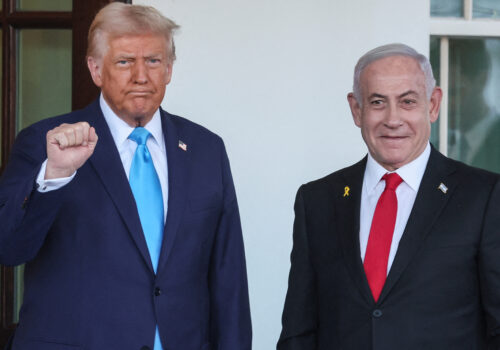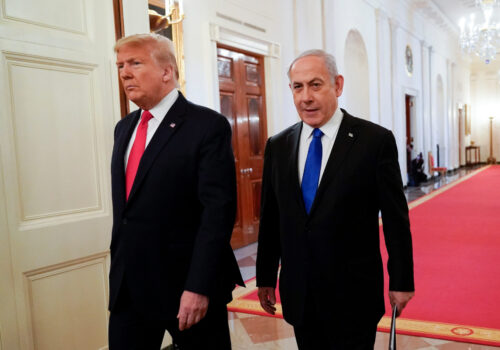Experts react: Is the US really going to ‘take over’ the Gaza Strip?
“The US will take over the Gaza Strip, and we will do a job with it too.” During a press conference on Tuesday with Israeli Prime Minister Benjamin Netanyahu, US President Donald Trump proposed that the United States take control of the Palestinian territory and rebuild it. While the real-estate mogul-turned-president said that he envisions Gaza becoming “the Riviera of the Middle East,” Arab states and other countries quickly rejected the idea of direct US intervention, arguing that it would in effect force out Palestinians from the land and abandon the long-standing US commitment to a two-state solution to the Israeli-Palestinian conflict. Below, Atlantic Council experts share their insights on how to decode Trump’s comments and how the remarks are already impacting the region.
Click to jump to an expert analysis:
Ahmed Fouad Alkhatib: If Trump is trying to pressure Hamas, it’s unlikely to work
Jonathan Panikoff: Trump is serious about shaking up the Middle East, even if his Gaza plan isn’t
Thomas Warrick: Trump has pushed the US further ahead on Gaza in a month than Biden ever did
Jennifer Gavito: It’s a concept without a plan—made all the more difficult by dismantling USAID
Arwa Damon: The way to avoid “history repeating itself” is not to repeat the core cause
If Trump is trying to pressure Hamas, it’s unlikely to work
Though many were extremely taken aback by Trump’s remarks alongside Netanyahu, a few rushed to view them through the prism of Trump’s hardball negotiation style. By setting the goalpost in such an extreme territory, Trump might then gradually negotiate down and obtain favorable conditions for whatever policy he hopes to implement between Israel and Gaza.
However, what remains puzzling in this equation is who the president might be trying to influence with such outlandish and extreme declarations that violate decades of established US policy toward the Middle East, international humanitarian law, and diplomatic norms.
It is well understood that Jordan and Egypt are in no position to help facilitate the forced or even voluntary removal of more than two million Gazans out of the coastal enclave and into their respective territories. Even if those countries wanted to acquiesce to the president’s blackmail, the US foreign aid that they receive is insufficient to justify the geopolitical, economic, security, and social risks and implications such a move would entail. Clearly, the president is not trying to pressure Israel or its leadership, represented by Netanyahu, who received a hero’s welcome in Washington as the first foreign leader to visit the White House in Trump’s second term. That leaves the Palestinians, and Hamas in particular, as the likely party that Trump was trying to pressure with his unprecedented declarations on Tuesday.
Contextually, Netanyahu’s visit comes on the heels of the impending negotiations to begin the second phase of the cease-fire between Hamas and Israel. Netanyahu is involving his close confidant, Ron Dermer, instead of Mossad’s head, David Barnea, as the negotiations are expected to be political and less technical. The expected goal is to tie the implementation of the second phase with a political horizon that displaces Hamas as the sole authority in Gaza and prevents the terror group from remaining in power after the withdrawal of all Israeli troops from the decimated Palestinian strip.
It is unclear how these threats can credibly force Hamas to moderate and shift its position vis-à-vis the negotiations. It’s also unclear whether the group is susceptible to threats of US military action against the territory as a way to induce behavioral change. Hamas has unleashed the most destructive chapter in Palestinian contemporary history upon the people of Gaza, and it is still ruthlessly acting as if it will enjoy the spoils of war, including the full reconstruction of the territory. Although the entire world, including Arab and Muslim nations, has made it clear that there will be no reconstruction of Gaza while Hamas remains in complete control (and for good reason), Hamas has yet to signal that it is willing to give up anything in order to facilitate Gaza’s recovery.
Trump’s comments are extraordinarily harmful to the prospects of regional stability, to moderate Arab Sunni states, and to the prospects of Israeli-Saudi normalization, with the kingdom releasing a statement on Wednesday saying that it will not join the Abraham Accords if there isn’t a Palestinian state. The comments also reek of an incoherent foreign policy that is defined by threats, not compelling US leadership. Indeed, these remarks are fuel for the United States’ enemies, especially the likes of China, Iran, and Russia, the last of which will now likely point to US actions to justify its illegal and ruthless invasion of Ukraine.
The rules-based world order that the United States has led for decades must not be sacrificed for neo-imperialism that breeds chaos and instability while eroding trust in US leadership among its allies and emboldening its foes.
—Ahmed Fouad Alkhatib is a resident senior fellow with the Scowcroft Middle East Security Initiative at the Atlantic Council’s Middle East Programs and an analyst who grew up in Gaza City.
Trump is serious about shaking up the Middle East, even if his Gaza plan isn’t
Many Americans and allies in Europe and the Middle East woke up this morning confused and shocked to learn of US President Donald Trump’s declaration that the United States will “take over” the Gaza Strip, and its approximately two million inhabitants should be moved elsewhere. They shouldn’t be.
Trump’s plans and goals to end many of the traditional domestic and global norms we’ve experienced in the post-World War II period were never a secret. And Tuesday night’s policy declaration is not part of a strategic master plan to get Hamas to agree to a deal with better terms for Israel and the United States. Nor is it a strategy to cajole Egypt or Jordan to be more accommodating to US preferences in the region, as some commentators have assessed.
The plan the president announced is about remaking the world and US interests in it in a fundamental way. Does the president truly believe his plan can ultimately be executed? Maybe, maybe not. If it cannot, then it could indeed serve as a starting point for negotiations over Gaza with Arab states, making the result the same regardless of whether he intended the plan to be a serious proposal or not.
But even if his plan is a nonstarter, which it almost certainly is, it’s not because that was the intent all along. Rather, it is because he doesn’t fully understand, or perhaps care, about the history of the region, the complexities of intra-Palestinian relationships, the potential implications for US allies, or, most importantly, the emotional connection most people have to their home. …
Read more from Jonathan Panikoff, the director of the Atlantic Council’s Scowcroft Middle East Security Initiative and a former deputy national intelligence officer for the Near East at the US National Intelligence Council:
Trump has pushed the US further ahead on Gaza in a month than Biden ever did
Since his election win on November 5, I have told colleagues that Trump would eventually realize that only the United States can organize a lasting solution to the problem of who will govern postwar Gaza. I thought this would happen in June, given the start of the new US presidential administration and the seasonal rhythms of Middle East diplomacy. I never would have guessed that the realization would hit Trump during a press conference on February 4.
Those criticizing Trump for calling for the displacement of more than two million Gazans are fundamentally misunderstanding how Trump sees Gaza: Trump is a longtime billionaire property developer who has recently come to understand the extent of Gaza’s devastation. He is right that it will likely take more than a decade to rebuild Gaza—and that the only way Gaza will be rebuilt even in that amount of time is if Hamas plays no role in Gaza’s governance going forward. Trump is also right on this point: No Arab government is going to donate billions of dollars to rebuild Gaza if Hamas is able to attack Israel in three or four years, turning all that reconstruction back into rubble.
Trump, as a developer used to buying and selling properties, does not understand the depth of Gazans’ attachment to the land and their absolute unwillingness to be further dispossessed after what happened to so many of them in 1948. The obvious precedent is their next-door neighbors, who were steadfast after almost 1,900 years of dispossession. The people of Gaza are never going to leave.
Trump also underestimates Egyptian and Jordanian unwillingness to accept Palestinians from Gaza or the West Bank under any circumstances, even if it were to mean the cutoff of US assistance to those countries. There is quite literally no tool in the US toolbox that could persuade the leaders of Egypt or Jordan to change their minds on this point. Trump’s advisors know this, but they would likely rather have Trump hear this directly from Jordanian King Abdullah on February 11, and from Egyptian President Abdel-Fattah el-Sisi, who reportedly will visit the following week, rather than from them. Fair enough. Abdullah and Sisi need to tell Trump plainly, directly, and undiplomatically that they will not do this, so that discussions will move in a more productive direction.
What Palestinians and Arab leaders need to praise is the idea that the United States will directly involve itself, in a limited way, in organizing international efforts for Gaza’s transition. Trump is not serious about wanting to “own” Gaza. What the United States can usefully do needs to be negotiated with Israelis, Palestinians, and Arab governments, along with other major donors, such as European states and Japan. But the United States contributing to disarming unexploded bombs and rubble-clearing efforts, as Trump said the United States would do, is something that the Biden administration steadfastly refused to even consider. The Biden administration refused even when pressed by former US officials (I was one) who urged it to recognize that the only way this could turn out well for the United States, Israel, and the Palestinians would be for the United States to take a leadership role in organizing the efforts of others.
Much of what Trump suggested in the past twenty-four hours will need to be dialed back to what is workable. But no one predicted that Trump would push the United States to engage more on what postwar Gaza should look like in one month than the Biden team did in fifteen months.
—Thomas S. Warrick is the director of the Future of DHS project at the Scowcroft Center for Strategy and Security’s Forward Defense program and former deputy assistant secretary for counterterrorism policy at the US Department of Homeland Security.
It’s a concept without a plan—made all the more difficult by dismantling USAID
Tuesday’s comments by Trump sent shock waves not only through the Middle East, but also through his circles of supporters. The president campaigned on a platform of international disentanglement, not taking on new nation-building responsibilities like the one he is proposing in Gaza.
Not since the Marshall Plan, which saw massive investments in postwar Europe that continue to pay dividends today, has the United States successfully undertaken such a project. Indeed, most of its attempts have ended in abject failure (think Afghanistan, Iraq, and Libya). Why? Because the American people ultimately weren’t prepared for the massive, all-in, long-term investment in both dollars and troops that is needed to transform a warzone into a flourishing economy. And the United States now lacks the institutional infrastructure to conceive of such a project, thanks to the ongoing dismantling of the only US government organization with nation-building expertise: the United States Agency for International Development.
Ultimately, though, this is a concept without a plan, as it is predicated on the willingness of Israel’s neighbors—especially Egypt and Jordan—to take in massive numbers of Gazans at the expense of their already shaky political and economic stability. Other Arab foreign ministers joined them earlier this week in roundly rejecting any effort to displace Palestinians, setting the stage for a difficult conversation when Jordan’s King Abdullah becomes the first Arab leader to visit Trump in the White House next week.
—Jennifer Gavito is a nonresident senior fellow with the Scowcroft Middle East Security Initiative within the Atlantic Council’s Middle East Programs and a former US acting principal deputy assistant secretary of state for Near Eastern affairs.
The way to avoid “history repeating itself” is not to repeat the core cause
We just heard the US president endorse the idea of committing ethnic cleansing and forcibly resettling a population. We just heard a US president lay out the potential intent to draw the United States into a war crime. That is stunning in itself. However, it’s highly likely that Trump will be given a “pass” given how accustomed the world has grown to his history of irresponsible rhetoric. Many analysts are already predicting that his sweeping commentary will need to be dialed down into an actual executable plan.
The speed of the Saudi response, reaffirming Riyadh’s commitment to a Palestinian state as a precondition to establishing diplomatic ties, is an indication of how unpalatable Trump’s plan is. It could also give Egypt and Jordan the courage they need to stand firm against the United States’ not-so-subtle threats of consequences if they refuse to take in more than two million Gazans.
“It’s terrifying. But what we fear is not the rhetoric of one man,” a Palestinian friend of mine in Gaza messaged me. “We fear forced displacement and losing the right to return like our grandparents and great-grandparents did. What we fear is losing our home, our right to our home, to see our families, to have roots.”
Gaza is a demolition zone. Trump is 100 percent correct on that, even if he did neglect the fact that US bombs dropped by Israel are the culprit. Gaza does need a massive effort to clear it of explosives and rubble and then to start reconstruction. But the clarity of his comments end there. The rest of this haphazardly laid out “plan”—if it can be called that—is little more than psychological torture for a population that is already on the edge of a mental abyss.
To somehow think that the solution, as Trump stated, to avoid “history repeating itself” is to repeat the core cause—stealing of land, illegal occupation, the forced displacement of Palestinians, denying the right of return—is rather ludicrous.
The sad irony is that it would be among the best outcomes for Palestinians to have Gaza rebuilt and transformed into the “Riviera of the Middle East.” But there is nothing in Trump’s comments or in Netanyahu’s apparent glee at them that suggest that this will be a Riviera for those whose land it is: the Palestinians.
—Arwa Damon is a nonresident senior fellow at the Atlantic Council’s Rafik Hariri Center and Middle East Programs; the president and founder of the International Network for Aid, Relief, and Assistance (INARA); and a former international correspondent for CNN.
The reality of “owning” Gaza would carry large costs and risks—including an armed insurgency
Trump’s suggestion that the United States could clear and rebuild Gaza presupposes a significant level of US military and economic involvement. In his comments, Trump was ambiguous about the deployment of US troops to secure Gaza and oversee its reconstruction, saying “We’ll do what needs to be done.” This would require a long-term commitment, with estimates of up to fifteen years for full reconstruction. The question of who would pay for such an enormous endeavor remains unanswered. Given the immense cost and the political sensitivity of the region, it is unclear if the United States would foot the bill entirely or if there would be international partners involved.
Trump’s recent statements that he can get Egypt and Jordan to host Gazans, combined with his statement about “owning Gaza,” suggest a bargain: The United States could take on Gaza’s reconstruction but, in exchange, Jordan and Egypt would host displaced Palestinians. Neither country wants to administer or secure Gaza. But they also do not want to be seen as complicit in Israel’s actions and have historically been reluctant to host more Palestinians, fearing that it would lead to the permanent displacement of the Palestinian people and thus the end of Palestinian statehood.
While this could be seen as a diplomatic move, it raises several significant concerns, not least of which is the formation of an armed insurgency. US troops or contractors in Gaza could come under fire from militant groups, particularly Hamas, which has not been fully dismantled despite efforts by Israel and others. Recent reports of Hamas recruiting more than ten thousand new members, along with the public presence of large groups of Hamas fighters at recent hostage handover events, show that the group remains an operational force. The president could have been thinking that if Egypt and Jordan take responsibility for the Gazan people, then there wouldn’t be an insurgency as there would be no one to fight. However, that would mean Gazans would have to leave Gaza altogether, which is a tall order given their desire for statehood and fears that a temporary displacement for reconstruction would actually lead to a permanent displacement and not being able to return.
Additionally, Trump’s proposal seems to overlook the deep animosity many Gazan Palestinians have toward the United States regarding US military support for Israel. The United States is often viewed as a partial actor in the Israeli-Palestinian conflict, which could fuel armed resistance to any perceived US-led efforts in Gaza. There is also the issue of who would take responsibility for the security of Gaza during the rebuilding process. Arab states have shown no interest in stepping into this role, fearing the political ramifications of being seen as complicit in the displacement of Palestinians or Israel’s actions.
The logistics of this plan remain unclear. Would Palestinians be willing to leave Gaza voluntarily or would they be forcibly relocated? This question is crucial, as any attempt to remove or displace a population would likely face resistance and could lead to further violence. Trump’s idea might therefore be seen as a negotiating tactic, similar to his approach with trade deals, but its success would hinge on navigating complex regional dynamics and the realities of a volatile and heavily armed Gaza.
—Alex Plitsas is a nonresident senior fellow with the Scowcroft Middle East Security Initiative, the head of the Atlantic Council’s Counterterrorism Project, and a former chief of sensitive activities for special operations and combating terrorism in the Office of the Secretary of Defense.
Further reading
Wed, Jan 15, 2025
Experts react: Everything you need to know about the Israel-Hamas cease-fire and hostage deal
New Atlanticist By
Does this deal really mark the end of the war? What’s next for Gaza’s reconstruction, for Israel’s security, and for wider regional efforts, such as Israeli-Saudi normalization? Atlantic Council experts share their answers to these and other pressing questions.
Sun, Feb 2, 2025
Israeli-Saudi normalization is within reach. Here’s what Trump and Netanyahu need to do next.
New Atlanticist By Daniel B. Shapiro
A carefully sequenced series of steps, beginning but extending beyond the two leaders’ meeting this week, has the best likelihood of success.
Fri, Jan 31, 2025
What the Gaza war reveals about the limitations of missile defense
MENASource By Jean-Loup Samaan
The Gaza War serves as a cautionary tale about what missile defense can achieve, what it should achieve, and where it falls short.
Image: US President Donald Trump speaks at a press conference with Israeli Prime Minister Benjamin Netanyahu (not pictured) in the East Room of the White House in Washington, DC 04 February 2025. President Trump said that the he wants the US to take an ‘ownership position’ of Gaza.



